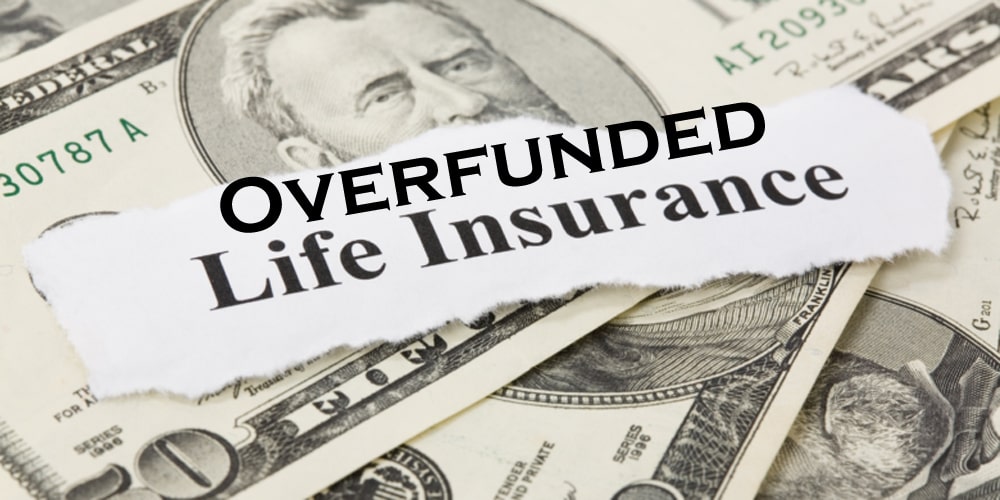
ImageCredit: clientfocusedadvisor
What Is An Overfunded Life Insurance Policy?– An approach known as “overfunded life insurance” involves making a larger contribution to a permanent life insurance policy than is required to pay the policy’s premiums. This approach increases the growth of your policy’s cash value, offers tax benefits, and is an appealing investment option for people who want financial flexibility and long-term wealth growth.
Read: Best Tips for Buying Health Insurance Policy for Family
Whole life security and other extremely durable strategies can assist with giving a monetary cushion to your friends and family after you’ve passed. While the death benefit is the primary benefit of any life insurance policy, there may also be other ways the policy can assist you in working toward your own financial objectives. For instance, for a variety of reasons, some people overfund their life insurance policy. How overfunded life insurance works and who might benefit from this strategy are discussed here.
When you contribute more to a life insurance policy than is required, you’ve overfunded it. There is a cash value component in policies for permanent life insurance, such as universal or whole life insurance. As a result, you increase your contribution to the policy’s cash value by overfunding it.
You regularly need to pay a specific premium every year or every month to guarantee that the strategy stays in power and that your recipient will get the passing advantage.
Remember that various strategies have various standards, and there are limits on the greatest sum that can be paid into a strategy. If your policy is overfunded, you should probably talk to a financial representative about it. Additionally, a tax professional can assist you in avoiding additional tax liabilities and other issues related to taxes.
Overfunding a Policy is Not Necessary
When it comes to standard-term life insurance policies, the entire amount you pay goes toward the death benefit and administrative fees.
This is the cheapest option for life insurance and covers a predetermined period. The policy will not pay the beneficiary if the holder dies during the term of the policy.
Permanent Life Insurance Policies Benefit From Overfunding
Permanent life insurance policies, on the other hand, cost more, but only a portion of the funds go toward the death benefit and administrative fees.
The remaining funds are simultaneously deposited into a cash-value life insurance savings account. This kind of insurance covers you for the rest of your life and provides benefits in the event of your death.
Why Get a Policy for Permanent Life Insurance?
One of the benefits of having life insurance that is overfunded is that you can use the cash value to obtain tax-free loans from your savings for a variety of purposes.
The repayment terms for the loans may be partially customized to meet your needs and have lower interest rates depending on the insurance company you select.
Cash value growth is ensured by these policies’ potential to earn interest and dividends.
Overfunding your extra security isn’t direct or accessible for all approaches, however, the two most normal sorts are widespread life coverage and entire life coverage strategies.
Universal Life Insurance Policy
Universal life insurance has a set last installment that the policyholder should pay month to month for the demise benefit and regulatory expenses. The cash value is credited with any additional funds.
Universals can be divided into two categories:
- Indexed universal life insurance
- Variable universal life insurance
When Should a Life Insurance Policy Be Overfunded?
In some circumstances, it might make sense to overfund an insurance policy. Here are a few illustrations.
1- You Plan to Access Money Worth
Overfunding a disaster protection strategy may be helpful on the off chance that you intend to utilize the arrangement’s money esteem further down the road. Overfunding the policy could potentially increase the amount of money that is available in the future because you typically have the ability to borrow money or withdraw money from the cash value of your permanent policy. Interest will also be charged on loans
2- You Want to Manage Your Taxes
Life insurance policies have special tax features, as previously stated. There are several different ways that overfunding your extra security strategy could assist with giving tax reductions, yet there are additionally likely outcomes to consider.
- Potential for development without charge responsibility: When you earn interest on a life insurance policy, you typically do not have to pay income taxes. However, when you withdraw money, gains are subject to taxation. That is not the same as the premium you acquire in available bank and money market funds, which expect you to report those profits to the IRS every year.
- There is no annual IRS addition: There is no annual limit on how much you can contribute to a life insurance policy that is set by the IRS. Having said that, the amount of money you can put into a life insurance policy before you have to pay taxes is still limited. If you go over that limit, you run the risk of getting a Modified Endowment Contract (MEC), which means you might not be able to take advantage of the better tax treatment that comes with a cash-value life insurance policy. The most extreme breaking point might rely upon the demise benefit and different elements, and there might be impediments in light of the strategy you buy.
The duty elements of a life coverage strategy can be muddled, so inspecting your system with an expense proficient and your monetary delegate prior to pursuing any choices is significant.
Verify The Age of Your Policy
Before you overfund your cash-value life insurance, verify the policy’s age. Some senior insurance policies, particularly those from the 1980s, maintained cash accumulation benefits that are no longer available today.
You might have to give up some of the benefits that are already provided if you want to add a paid-up additions rider to this policy.
Why do People Overfund Life Insurance?
There are two primary reasons why policyholders overfund life insurance.
1- High Net Worth
Policyholders like entrepreneurs and Presidents, with high total assets, use overfunded disaster protection to amass retirement reserves. The majority of the time, they have delayed retirement planning, exceeded their 401(k), or don’t qualify for a Roth IRA.
2- Savings Account
A great way to start a savings account is to overfund your life insurance and build up the cash value. While you can still take advantage of the living benefits, your assets will be shielded from market and income taxes in this manner.
The Benefits Of Having Overfunded Life Insurance
Having an OLI has many benefits, which we list below:
1- Dividend Payments
If you have whole life insurance, the company will almost certainly give you dividends. These can be used to build up cash value and death benefits.
2- Growth and payouts with tax advantages
One of the main advantages of OLI is that growth and payouts have tax advantages. Because the funds are tax-deferred, it is simple to build cash value, making them an excellent alternative to standard savings accounts. Also, any withdrawals of the assets are tax-exempt.
3- Death Benefit
The primary objective of life insurance is the death benefit. Another advantage of an OLI is the tax-free payout to the policyholder’s beneficiaries.
The Insurance Information Institute estimates that benefits and claims from insurance will total $97 billion in 2021 alone.
The establishment presently can’t seem to deliver the information for 2022, however, we anticipate that this should be more than $100 billion.
4- Living Benefits
You can get a portion of the death benefit as one of your living benefits if you have a qualifying chronic condition.
5- Early Policy Payoff
If you overfund your policy enough, the insurance company will never be able to cancel it, protecting your loved ones.
6- Improved Investment Options
Some OLIs, such as Indexed Universal Life Insurance (IUL) and Variable Universal Life Insurance (VUL), permit you to store a portion of your policy’s cash value in sub-accounts linked to the stock market, providing you with more adaptable investment options.
7- Protection from the Market
Since you can decide how much cash value goes into the market-related sub-accounts, you won’t have to worry about losing everything if the market crashes.
The OLI vests and safeguards the cash value account whenever the market falls.
8- No Contribution Restrictions
Unlike some retirement plans, such as the 401(k), OLI does not place a significant limit on the amount of money that can be contributed. Notwithstanding, on the off chance that you contribute a lot in seven years, your strategy might turn into a Changed Gift Agreement (MEC) and lose its expense leaned toward status.
9- No Age-Based Restrictions
There are no age-based restrictions. Unlike a 401(k) or IRA, the cash value can be accessed before a certain age without incurring any fees.
10- Protection of The Assets
In contrast to funds held in conventional savings accounts, those in your OLI are shielded from creditors and legal claims, depending on the state in which you live.
The Drawbacks of Overfunding Life Insurance
Naturally, not everything is perfect. There are two or three hindrances and threats to overfunding your disaster protection.
1- Extra Fees
Despite the numerous benefits of overfunded life insurance, policyholders are obligated to pay for them. Even regular permanent life insurance has higher premiums than the more cost-effective term life insurance, but the monthly payments add up to the total cost of the policy.
However, insurance costs are typically underestimated by individuals.
Before you overfund, it’s critical to explore the insurance agency to ensure that their expenses are appropriate for you. In some businesses, the fees have a smaller percentage impact on your funds the higher your cash value grows.
2- The Danger of Policy Lapse
If you want to borrow money from your overfunded life insurance policy, always double-check to make sure you don’t take out too much. Your strategy should be completely financed consistently or it will slip by, be dropped, and you will in all probability be expected to pay charges on the arrangement advances.
3- Modified Endowment Contract Risks
Something contrary to the impediment referenced above happens when you contribute a lot to your OLI, unintentionally making a Changed Gift Agreement (MEC), which doesn’t have tax reductions.
There are also penalties imposed by the government, like having to pay a 10% tax penalty if you withdraw the money before you turn 5912 years old.
Conclusion
Some people might be right to overfund a life insurance policy. However, because this strategy isn’t for everyone, you should talk to your financial advisor and a tax professional before deciding what’s best for you.







